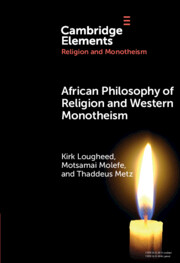Element contents
African Philosophy of Religion and Western Monotheism
Published online by Cambridge University Press: 26 February 2024
Summary
Keywords
- Type
- Element
- Information
- Online ISBN: 9781009524919Publisher: Cambridge University PressPrint publication: 28 March 2024
References
- 22
- Cited by

